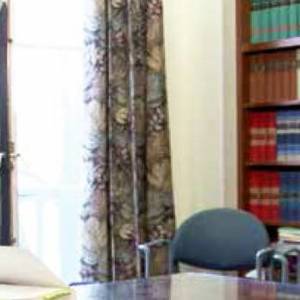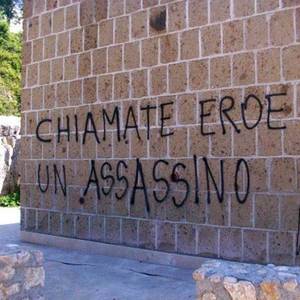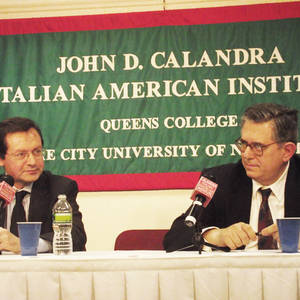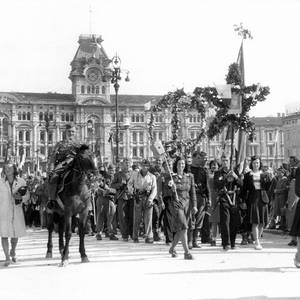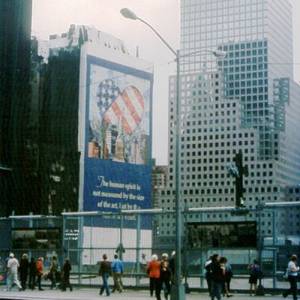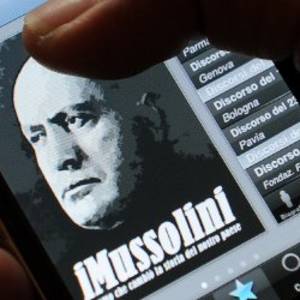A fascinating exhibition titled “Propaganda. The Art of Political Indoctrination” conceived and curated by Professor Nicola Lucchi of Queens College opened March 4th at New York University’s Casa Italiana Zerilli-Marimò, followed by a panel discussion with artistic advisors and NYU Professors Ruth Ben-Ghiat and Ara Merjian. It showcases a selection of works from the Fondazione Massimo e Sonia Cirulli mostly (but not exclusively) dating from Italy’s fascist period and aims to inspire a reflection on the mechanisms of political propaganda under totalitarian regimes as well as during “democratic” times.
You chose: fascism
-
-
New York University Professor of Italian Studies and History Ruth Ben-Ghiat discusses her new book Italian Fascism’s Empire Cinema. This interview aired on our TV show and is now available online.
-
Graziani was notorious as Benito Mussolini's military commander in colonial wars in Ethiopia and Libya where he carried out massacres. Recently in Rome was honoured with a mausoleum and memorial park. January 31 at 6:30 pm (John D. Calandra Italian American Institute - 25 West 43rd Street, 17th fl.) a roundtable - free and open to the public - will discuss Graziani's role under fascism, rehabilitation attempts of Fascist war leaders in Italy and public opposition to this political trend. With Lidia Santarelli (Brown University), Yemane Demissie (New York University). Moderator: Andrea Fiano (journalist and former Chairman of CPL). Respondent: Girma Abebe, Former Counselor, (Ethiopian Delegation to the UN).
-
What is a genocide and how does it occur? This is a question that we Italians can and should ask as Remembrance Day (January 27th) approaches again this year. We should ask ourselves if what e remember and how we remember is enough. And, we should take into consideration the sense of saturation that this institutional recurrence can provoke in some of us. Can we try to ask some new historiographical questions this year, seventy years after the beginnings of the deportation from Italy? Is the category of genocide useful for the historical interpretation of the Holocaust in Italy, and specifically of the Italian participation in the deportations and extermination of Jews in 1943-45?
-
Foreign editor of La Stampa Paolo Mastrolilli presents at Calandra Institute his latest work, "The Italian Brothers," a novel inspired by the lives of his father and his uncle during World War II.
-
EDITORS' NOTE: Mr. Jasha M. Levi, a Yugoslav Jewish antifascist in the 1930s and a fighter against dictatorships and genocides for all his life, fled the Nazis and his native Sarajevo for Italy. Here he—as a foreigner whose whereabouts remained unknown "to the Nazis and their Italian collaborators"—was spared "the cruel fate suffered by Italian Jews deported in cattle cars from Milan or burned in a crematorium in Trieste." Mr. Levi, who recounted his personal experience in a political memoir, "Requiem For A Country," asked i-Italy to publish the following short essay. In complying with his request, we believe that his balanced personal account not only, as he concludes, "does not diminish the memory of the eight thousand murdered Italian Jews," but may actually contribute to a better understanding of their tragedy—of which Italians, as a government and as a people, bear a collective historical responsibility, despite the good that some of them may have done in helping hundreds like Mr. Levi to survive.
-
Op-EdsA recent petition by Chicago academics to rename Balbo Drive in Chicago has generated a counter-petition and ignited a small controversy in the Italian American community.
-
"I wrote this a few weeks ago but the intolerance is growing... The most venomous blabber so far has been the Newt's equating of Moslems to NAZIs and 9/11 to the Shoah. Given his recently reported conversion to Roman Catholicism, I assume the next Newt revision is the Inquisition and the Crusades and then, I assume, there is more to come. In Europe such Newtish hate mongering gets quickly labeled neo- or not-so-neo-Fascism. Here in the USA it simply gets iterated to the point of Foxy 'fair and balanced' 'facts.' ... But a far more serious threat to the usually 'tolerant' climate of New York City is the real, but mostly imaginary, insults used by intolerance mongers to sell one or another politically partisan product such as a plethora of pandering candidates for local or statewide office..."
-
Capturing Italy’s encounter with California in Frank Capra’s documentary "La visita dell’ Incrociatore Italiano Libia a San Francisco, Calif., 6-29 Novembre 1921"
-
The most downloaded application in Italy right now, I-Mussolini, a collection of his speeches, causes debates and controversies all over the world.































